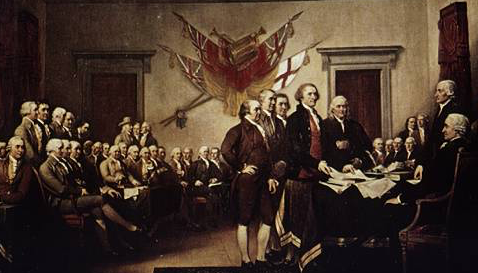The better to secure and perpetuate mutual friendship and intercourse among the people of the different States in this Union, the free inhabitants of each of these States, paupers, vagabonds, and fugitives from justice excepted, shall be entitled to all privileges and immunities of free citizens in the several States; and the people of each State shall free ingress and regress to and from any other State, and shall enjoy therein all the privileges of trade and commerce, subject to the same duties, impositions, and restrictions as the inhabitants thereof respectively, provided that such restrictions shall not extend so far as to prevent the removal of property imported into any State, to any other State, of which the owner is an inhabitant; provided also that no imposition, duties or restriction shall be laid by any State, on the property of the United States, or either of them.
First paragraph of Article IV of the “Articles of Confederation and perpetual Union between the states of New Hampshire, Massachusetts-bay Rhode Island and Providence Plantations, Connecticut, New York, New Jersey, Pennsylvania, Delaware, Maryland, Virginia, North Carolina, South Carolina and Georgia.” The articles were written up by a committee of the Second Continental Congress, which commenced on July 12, 1776; an approved version was sent to the states for ratification on November 15, 1777. The Articles of Confederation came into force on March 1, 1781, after being ratified by all 13 states. Its signatories, by state, were
Connecticut:
- Roger Sherman
- Samuel Huntington
- Oliver Wolcott
- Titus Hosmer
- Andrew Adams
Delaware:
- Thomas McKean
- John Dickinson
Nicholas Van Dyke
Georgia:
- John Walton
- Edward Telfair
- Edward Langworthy
Maryland:
- John Hanson
- Daniel Carroll
Massachusetts Bay:
- John Hancock
- Samuel Adams
- Elbridge Gerry
- Francis Dana
- James Lovell
- Samuel Holten
New Hampshire:
- Josiah Bartlett
- John Wentworth Jr.
New Jersey:
- John Witherspoon
- Nathaniel Scudder
New York:
- James Duane
- Francis Lewis
- William Duer
- Gouverneur Morris
North Carolina:
- John Penn
- Cornelius Harnett
- John Williams
Pennsylvania:
- Robert Morris
- Daniel Roberdeau
- Jonathan Bayard Smith
- William Clingan
- Joseph Reed
Rhode Island and Providence Plantations:
- William Ellery
- Henry Marchant
- John Collins
South Carolina:
- Henry Laurens
- William Henry Drayton
- John Mathews
- Richard Hutson
- Thomas Heyward Jr.
Virginia:
- Richard Henry Lee
- John Banister
- Thomas Adams
- John Harvie
- Francis Lightfoot Lee
This passage shows a central feature of the union from its inception: the mutual recognition by the states of the status as, and freedom of, their citizens. It also more-than-implicitly defended the institution of chattel slavery.

1 reply on “Articles of Confederation”
What would come of these thoughts today?